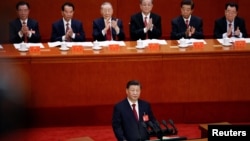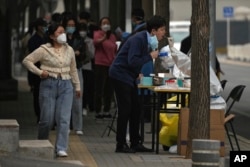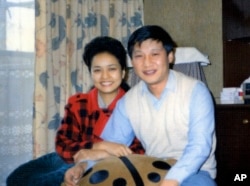Standing before some 2,300 Chinese Communist Party elite members and giving a nearly two-hour long speech at the opening of the Party Congress, China's President Xi Jinping looked in full control, at the helm of a giant nation growing ever more powerful economically and geopolitically.
But applause aside, Xi knows he faces many critics from within his party and without.
A rules-breaker the likes of which China has not seen in recent decades, Xi has ruffled many feathers, to say the least.
He has rewritten the constitution to end term limits, jailed members of the top echelon of power and punished hundreds of thousands of other lower ranking officials in his wide-ranging corruption campaign, and put the military firmly under the control of the party.
His past two five-year terms have seen him promote the China dream of turning the country, once occupied by foreign invaders and weakened by wars, into a great nation again — no longer just a factory of the world, but a confident major player that is increasingly rivaling the United States economically and technologically.
Under Xi, China also oversaw massive infrastructure and investment projects in many countries as part of the Belt and Road Initiative — an ambitious plan to build a modern day Silk Road trading route stretching across continents. He also brought Hong Kong firmly under Beijing's control after 2019's widespread protests and pushed back against what he sees as Washington and Taiwan trying to change the status quo by flying daily warplanes near the island China hopes to reunify with one day.
Critics have called him a micromanager at best and dictator at worst, and likened him to China's former egocentric leader Mao Zedong, accusing him of trying to stay in power indefinitely.
Currently his zero-COVID policy and strict large-scale lockdowns, touted as sparing China more devastating loss of life, are blamed for hurting China's economy and the global supply chain.
"He thinks of the whole country's future and people's lives, but the Western media report a lot of negative things about him," said Luis Shen, a businessman who is a friend of Xi's.
Contrary to many analysts' prediction that Xi will not only get a third term at the end of the week-long 20th Party Congress, but serve indefinitely, Shen suggested Xi may be realizing his limits.
"He only wants to serve five more years to get everything done," he speculated.
Internal pressure from the party may be at play. "Because his fight against corruption was so fierce, he has offended many people and these are his own people [fellow party members]. In the end, one person alone can't do many things," Shen said.
Xi's career saw him joining the party as a youth only after several failed attempts, then working his way up from being party secretary of a village, to serving in county and city governments and later heading coastal provinces and Shanghai. He eventually made it to the central government, serving first as vice president and then in 2012 being selected to be the party's general secretary and a year later becoming president and chairman of the Central Military Commission.
Over the years, Xi has had many supporters and opponents.
Critics accuse him of targeting some political rivals in his anti-corruption campaign, rolling back human rights by implementing mass surveillance and putting a million ethnic minority Uyghur Muslims in internment camps, and overseeing the passage of the National Security Law in Hong Kong, which clamped down on freedoms in the former British colony.
He's also accused of imposing regulations on the technology sector and even the tutoring industry to stop children from being sent to cram schools after attending regular school. Critics also say he has built a personality cult around himself, with school children required to learn his ideology.
"Xi has concentrated too much power and does not listen much anymore," said Jean-Pierre Cabestan, a long-time China researcher at the French Centre for Research on Contemporary China, Hong Kong. "His insistence on the role of state-owned enterprises is unhealthy and counterproductive: only private firms are creating jobs in China today."
Xi is also criticized as being too entrenched in communist ideology. Unlike previous Chinese leaders, he was born after the Chinese Communist Party began ruling the country in 1949 and was educated completely under a new China.
His supporters, however, praise him for doing the necessary - fighting corruption as well as dealing with the excesses and inequality that have mushroomed following decades of rapid and free-wheeling development. These include banks overlending to the property sector — creating a huge bubble — and an outdated tax system that doesn't adequately tax big profitable tech firms, which has widened the wealth gap.
His administration has defended its controversial actions, insisting its internationally condemned camps for Uyghurs are language and vocational education facilities necessary for assimilation and eradication of religious extremism. It argues the security law in Hong Kong is necessary to restore order following disruptive unrest.
"Everyone approves of him," said Xu Shengyi, a Hong Kong man who came from China's Fujian province in the late 1970s, referring to how he and his family and friends back in the mainland feel about Xi. "Only he can rejuvenate China. … China needs a very strong leader. Without such a person, how do you govern three branches of the military, especially if they are corrupt and provincial leaders too?"
But of course, not everyone approves of Xi. A protest last week by a man who hung banners criticizing Xi's COVID policy and calling for a change in leadership is a rare public display of frustration that may be more widespread after nearly three years of epidemic-control restrictions.
Xi's friend Luis Shen said the Chinese leader will spend the next five years trying to achieve his goals for the country.
A top priority for Xi is continuing with poverty alleviation. Last year, he proudly declared nearly 100 million people have been lifted out of poverty during his terms in office, but millions more are believed to still be living on less than 1,000 yuan a month.
The years in which he worked and lived with farmers in a rural village in northwestern China's Shaanxi province gave him a true sense of how peasants lived.
"He wants the poor to reach a certain living standard," said Shen.
Xi also wants to finish building nuclear power plants to ensure a stable energy supply for China, according to Shen.
During his speech, Xi mentioned his goal of building "common prosperity" — seen as a redistribution of wealth — but like his other policies, it's unclear whether the party and people will praise or blame him for it. Already, his proposal to implement a property tax to stop speculation and narrow the wealth gap is proving unpopular within his party.
As to whether Xi will really only serve one more five-year term — which would be a relief for his critics but a disappointment to his supporters — China analyst Victor Gao said: "Nothing is final until it's officially announced."










